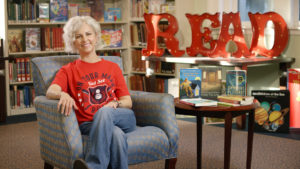
It began with a speech. Not a talk, but a speech.
This precision of language is what has set apart beloved children’s book author and two-time Newbery Medal recipient Kate DiCamillo in her decades-long career.
And the speech—which she delivered on January 20 at the American Library Association’s 2024 LibLearnX conference in Baltimore—was one of sorrow but also hope.
“Every story is a love story,” she began. DiCamillo recounted an early childhood in Philadelphia when her father would come home from work, sometimes telling her and her brother stories that “were dream-like, wondrous, layered, meandering.”
They featured witches, goblins, curses, spells, and gum-drop trees.
DiCamillo and her brother held their breath, because they were entranced, and because they were terrified of their father. “We never knew when he would lose his temper, when a table would get overturned, when some small or large cruelty would suddenly occur.”
She asked the audience to picture two small children sitting on either side of a large bear. The bear’s paws and sharp claws are draped over each child’s shoulders. And the children know the bear’s mouth is full of sharp teeth. “They know that at any moment the bear could casually, with no great effort at all, eviscerate them.” And while the children never forget that the bear is a wild animal, they discover that when a story is coming from the bear’s mouth, they are safe.
“It was like Scheherazade in reverse. As long as the bear was telling us a story,” she said, “we would not die. And in this way, each story my father told us was a love story.”
DiCamillo’s speech itself sifted through layers of story. The author talked about her childhood, growing up chronically ill. About staying in touch with her father sporadically over the years. About the birth of her best friend’s granddaughter, Rainey (“What a miracle it is to be loved from the minute you arrive in the world”). About her forthcoming novel, Ferris (Candlewick, March). About receiving letters from children over the past 20 years yearning for the return of Opal’s mom, a character in DiCamillo’s Newbery Honor–winning first novel, Because of Winn-Dixie (Candlewick, 2000).
Before her father died, in 2019, DiCamillo thanked him and forgave him. “I was thanking him for the stories,” she said. “I was forgiving him for the terror and the cruelty.
“And every time I tell a story, I am thanking him and forgiving him. I’m thanking him and forgiving him now as I tell you this story, which, in the end, is a love story too.”


